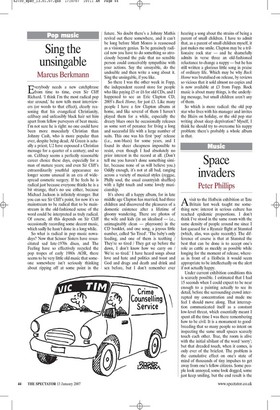Sing the unsingable
Marcus Berkmann Uverybody needs a new catchphrase i from time to time, even Sir Cliff Richard. 'I think I'm the most radical pop star around,' he now tells most interviewers (or words to that effect), clearly reasoning that his evangelical Christianity, celibacy and unfeasibly black hair set him apart from fellow purveyors of beat music. I'm not sure he is right: no one could have been more muscularly Christian than Johnny Cash, who is more popular than ever, despite being dead; Al Green is actually a priest; U2 have espoused a Christian message for a quarter of a century; and so on. Celibacy seems a perfectly reasonable career choice these days, especially for a man of mature years; and even Sir Cliff's extraordinarily youthful appearance no longer seems unusual in an era of widespread cosmetic surgery. If he feels he is radical just because everyone thinks he is a bit strange, that's no use either, because Michael Jackson is infinitely stranger. But you can see Sir Cliff's point, for now it's so mainstream to be radical that to be mainstream in the old-fashioned sense of the word could be interpreted as truly radical. Of course, all this depends on Sir Cliff occasionally recording some decent music, which sadly he hasn't done in a long while.
So what is radical in pop music nowadays? Now that Scissor Sisters have resuscitated sad late-1970s disco, and The Feeling have so effectively recycled the pop tropes of early 1980s AOR, there seems to be very little old music that someone somewhere isn't seriously thinking about ripping off at some point in the future. No doubt there's a Johnny Mathis revival out there somewhere, and it can't be long before Matt Monro is reassessed as a visionary genius. To be genuinely radical now you have to do something so atrociously beyond the pale that no sensible person could conceivably sympathise with your actions. Say the unsayable, do the undoable and then write a song about it. Sing the unsingable, if you like.
So there I was the other week in Fopp, the independent record store for people who like paying £5 or £6 for old CDs, and I happened to see an Eric Clapton CD, 2005's Back Home, for just £3. Like many people I have a few Clapton albums at home, and like several of them I haven't played them for a while, especially the dreary blues ones he occasionally releases as some sort of penance for living a long and successful life with a large number of suits. This one was his first 'pop' release (i.e., non-blues) for some years, and I found its sheer cheapness impossible to resist, even though I had absolutely no prior interest in the record at all. (Don't tell me you haven't done something similar, because none of us will believe you.) Oddly enough, it's not at all bad, ranging across a variety of musical styles (reggae, Philly soul, the usual countryish shuffles) with a light touch and some lovely musicianship.
It's above all a happy album, for in late middle age Clapton has married, had three children and discovered the pleasures of a domestic existence after a lifetime of gloomy wandering. There are photos of the wife and kids (in an idealised — i.e., unimaginably clean — playroom) in the CD booklet, and one song, a joyous little number, called 'So Tired'. 'The baby's only feeding, and one of them is teething / They're so tired / They get up before the dawn, I don't know how we carry on / We're so tired.' I have heard songs about love and hate and politics and toast and God and drugs and death and drink and sex before, but I don't remember ever hearing a song about the strains of being a parent of small children. I have to admit that, as a parent of small children myself, it just makes me smile. Clapton may be a trillionaire rock star — and he shamefully admits in verse three an old-fashioned reluctance to change a nappy — but he has still written a glorious little song in praise of ordinary life. Which may be why Back Home was brutalised on release, by reviews so vicious that it sold almost no copies and is now available at £3 from Fopp. Rock music is about many things, is the underlying message, but small children aren't any of them.
So which is more radical: the old pop star who lives with his manager and invites the Blairs on holiday, or the old pop star writing about sleep deprivation? Myself, I think he should try to overcome his nappy problem: there's probably a whole album in that.






















































 Previous page
Previous page